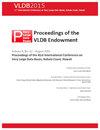OceanBase Paetica: A Hybrid Shared-Nothing/Shared-Everything Database for Supporting Single Machine and Distributed Cluster
IF 3.3
3区 计算机科学
Q2 COMPUTER SCIENCE, INFORMATION SYSTEMS
引用次数: 0
Abstract
In the ongoing evolution of the OceanBase database system, it is essential to enhance its adaptability to small-scale enterprises. The OceanBase database system has demonstrated its stability and effectiveness within the Ant Group and other commercial organizations, besides through the TPC-C and TPC-H tests. In this paper, we have designed a stand-alone and distributed integrated architecture named Paetica to address the overhead caused by the distributed components in the stand-alone mode, with respect to the OceanBase system. Paetica enables adaptive configuration of the database that allows OceanBase to support both serial and parallel executions in stand-alone and distributed scenarios, thus providing efficiency and economy. This design has been implemented in version 4.0 of the OceanBase system, and the experiments show that Paetica exhibits notable scalability and outperforms alternative stand-alone or distributed databases. Furthermore, it enables the transition of OceanBase from primarily serving large enterprises to truly catering to small and medium enterprises, by employing a single OceanBase database for the successive stages of enterprise or business development, without the requirement for migration. Our experiments confirm that Paetica has achieved linear scalability with the increasing CPU core number within the stand-alone mode. It also outperforms MySQL and Greenplum in the Sysbench and TPC-H evaluations.OceanBase Paetica:支持单机和分布式集群的无共享/万物共享混合数据库
在OceanBase数据库系统不断发展的过程中,必须增强其对小型企业的适应性。除了通过TPC-C和TPC-H测试外,OceanBase数据库系统已经在Ant集团和其他商业组织中证明了其稳定性和有效性。在本文中,我们设计了一个名为Paetica的独立和分布式集成体系结构,以解决由独立模式下的分布式组件引起的开销,涉及到OceanBase系统。Paetica支持数据库的自适应配置,允许OceanBase在独立和分布式场景中支持串行和并行执行,从而提供效率和经济。该设计已在OceanBase系统4.0版本中实现,实验表明,Paetica具有显著的可扩展性,并且优于其他独立或分布式数据库。此外,通过为企业或业务发展的连续阶段使用单一的OceanBase数据库,而不需要迁移,它使OceanBase从主要服务大型企业转变为真正迎合中小型企业。我们的实验证实,在独立模式下,随着CPU核数的增加,Paetica已经实现了线性可扩展性。在Sysbench和TPC-H评估中,它也优于MySQL和Greenplum。
本文章由计算机程序翻译,如有差异,请以英文原文为准。
求助全文
约1分钟内获得全文
求助全文
来源期刊

Proceedings of the Vldb Endowment
Computer Science-General Computer Science
CiteScore
7.70
自引率
0.00%
发文量
95
期刊介绍:
The Proceedings of the VLDB (PVLDB) welcomes original research papers on a broad range of research topics related to all aspects of data management, where systems issues play a significant role, such as data management system technology and information management infrastructures, including their very large scale of experimentation, novel architectures, and demanding applications as well as their underpinning theory. The scope of a submission for PVLDB is also described by the subject areas given below. Moreover, the scope of PVLDB is restricted to scientific areas that are covered by the combined expertise on the submission’s topic of the journal’s editorial board. Finally, the submission’s contributions should build on work already published in data management outlets, e.g., PVLDB, VLDBJ, ACM SIGMOD, IEEE ICDE, EDBT, ACM TODS, IEEE TKDE, and go beyond a syntactic citation.
 求助内容:
求助内容: 应助结果提醒方式:
应助结果提醒方式:


